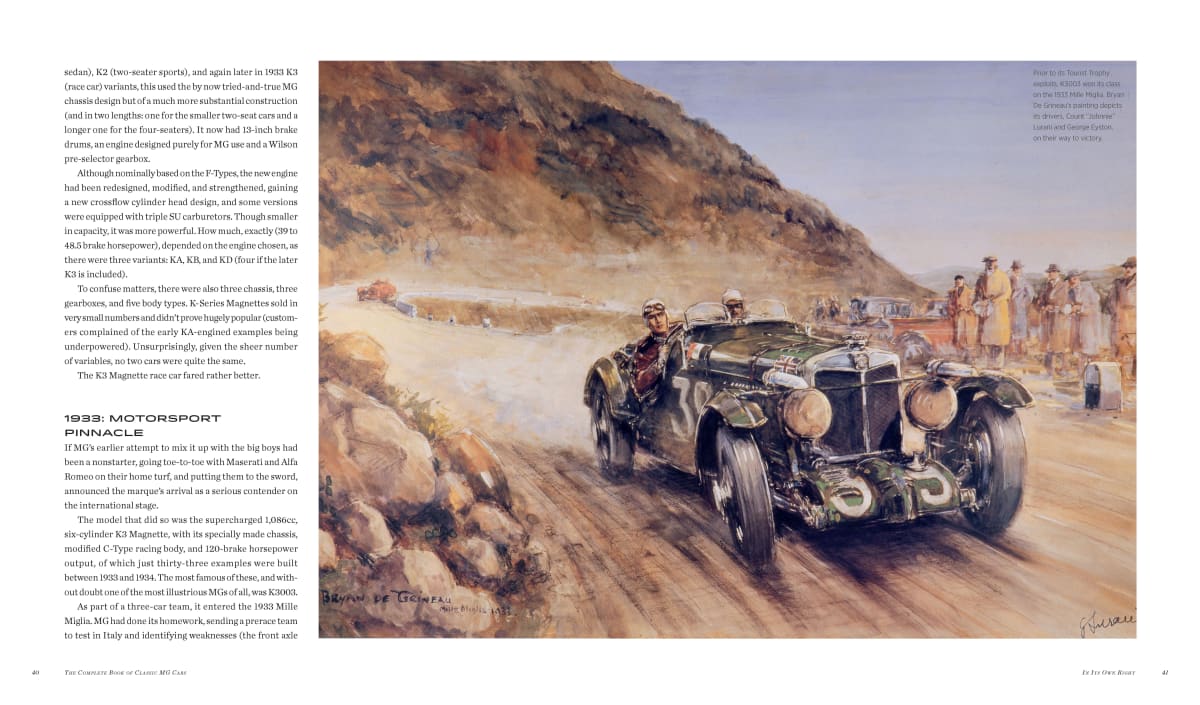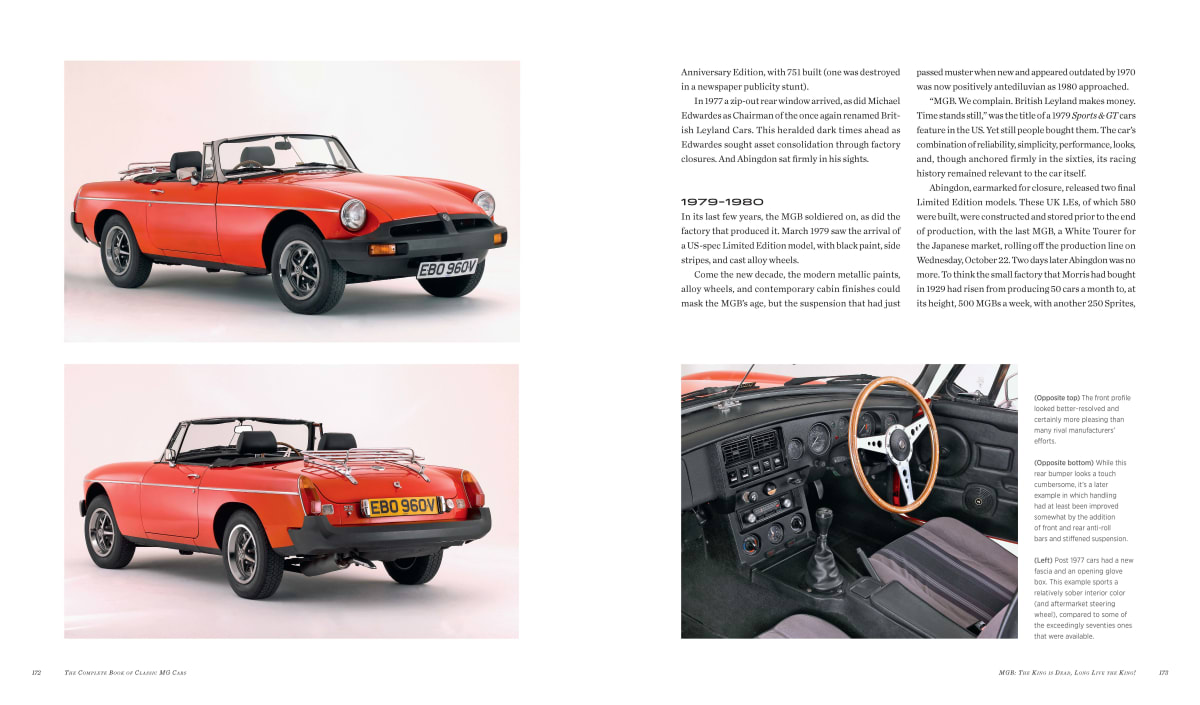Book Review: The Complete Book of Classic MG Cars
Published on Tue, Dec 1, 2020
By: Stuart Rowlands
If you're a fan of the iconic British roadster and the brand that practically defines that definition, our very own Stuart Rowlands declares that the Complete Book of Classic MG Cars is a must-read.
By Ross Alkureishi
Publisher: Motorbooks 2020
Pages: 239 Hardcover
200 Illustrations
ISBN#: 978-0-7603-6717-9
Price: $50.00 US: £35.00 UK: $65:00 CAN
_______________________________________________

TRUE CONFESSION: I am a huge lover of MG cars. When Ross Alkureishi’s book: The Complete Book of Classic MG Cars hit my desk, I couldn’t wait to open it. Yes, this is a wonderfully written and produced expert retrospective of MGs and their stylish, affordable, fun saloons and sports cars complete with a chronological model-by-model marque history. It is also unwittingly a tragedy of Shakspearian proportions here, in capsule form, a short recounting the demise of the vaunted British automobile industry.
For those of British ancestry, perhaps like this reviewer… perhaps not, this book is a master class with detailed text discussing design and production including specification tables highlighting key technical and performance data.
But for an MG lover, “The Complete Book of CLASSIC MG CARS” also brings to life the history of this fabulously sporty automobile brand including its trials and tribulations of ownership changes since its birthing just outside Oxford, England in 1924.
Taken as a work of art, as well has a history lesson, this beautifully designed book presents more than 200 photographs of MGs, all posed in dramatic fashion.
Particularly exciting are these classic machines at speed while hurtling down long straights and negotiating tight cornersas far afield as Le Mans, Brooklands, the Ulster Tourist Trophy, Bonneville Salt Flats and the Millie Miglia in the capable hands of such speed kings as Tazio Nuvolari, Earl Howe and Sir Henry Birkin.

The Mille Miglia painting of the 1,086cc six-cylinder K3 Magnet in full flight in 1933 driven by race winners George Eyston and Count Johnnie Lurani is superb - and I lust after the original.
But racing was not just MG’s playground as rallying, hill climbs and breaking land speed records all fueled the brand’s development cycle.
Supreme talents such as Stirling Moss and Phil Hill drove the marque to new heights. In August 1957, at Bonneville Salt Flats in Utah, Moss piloted the experimental EX179 (nicknamed The Roaring Raindrop) to break a series of records including blitzing the then current record of 203 mph.
Moss was at the top of his game and set a new mark of 245.11 miles per hour for the mile, breaking five US and World records.
Two years later MG returned to the Salt with Phil Hill piloting EX181 to even more class breaking runs records and topping out at 254.52mph. Fittingly enough, Hill started his racing career driving an MG TC on short, dirt ovals in southern California.
What I hadn’t known until Alkureishi’s book, is that the MG brand began life eleven years after the formation of Morris Motors Ltd in 1913, and was the brainchild of William Richard Morris - an entrepreneur of considerable talents who later went on to become Viscount Nuffield.
Morris’s first automobile was known as the Morris Oxford and began production using outsourced parts. The first MG came into being as its design required manufacturing its own parts.

The author also faithfully recounts the MG brand’s history following the end of the 1939-45 World War as Britain’s economy took a nose-dive and America’s economy boomed. After a fierce battle ending in a merger with Austin Cars - Nuffield formed BMC (British Motor Corporation).
The one bright spot for the Brits was the demand for these fun sports cars fueled by former American GI’s stationed in Britain. Sales took off in the USA and later in the rest of the world like a rocket. The MG series from TA to TF (all with right hand drive) followed by the MGA and MGB, both setting export records.
The launch of the MGA in September 1955 signaled the birth of the first true, modern day sports car. The radical new design based on MG’s successful Le Mans efforts sold a staggering 13,000 cars in its first year and went on to export 81,000 to America. In 1982, its successor - the MGB - became the best-selling sports car world-wide finding an enormous 512,000 new owners.
Sadly, after MGB sales reached their peak in the late 1980’s ownership changes and the economy started to take their toll. First it was subsumed into BMC then to BMW.
When that didn’t work, BMW handed off the remains to the seemingly inept and unrepentant Phoenix Group. Rechristening the new entity MG Rover, Phoenix ended up in bankruptcy in April 2005 and it seemed that all hope was lost. Except of course, it wasn’t.
In his fascinating AFTERWORD, Alkureishi tells us that today MG Motors is owned by the Chinese. The models are still conceived in Longbridge, just outside of Birmingham, in the United Kingdom and built in China. It is currently Britain’s fastest growing manufacturer.
For me - THE COMPLETE BOOK OF CLASSIC MG CARS is a masterpiece and hopefully many others will think so too.
My earliest memories of MG’s are riding in the family’s ‘TF’ in post-World War 2 Wales. Many years later, in the 70’s I owned a rather battered ‘B’ in Los Angeles in which I did my share of dating which quite happily, includes meeting my wonderful wife Jacky.





